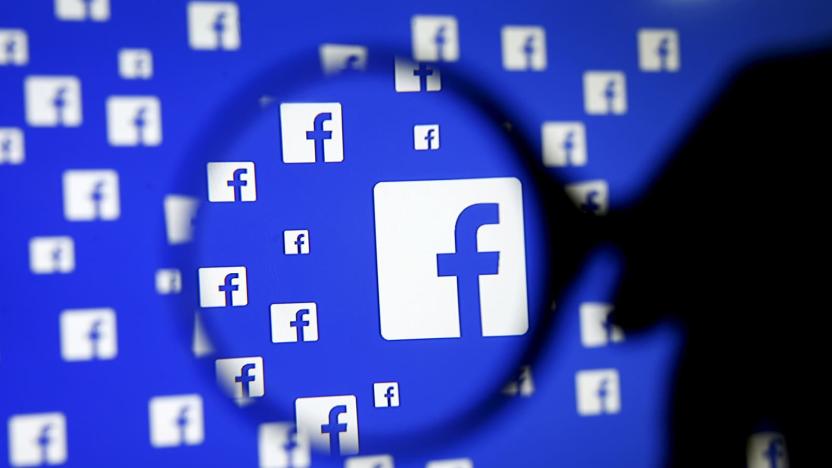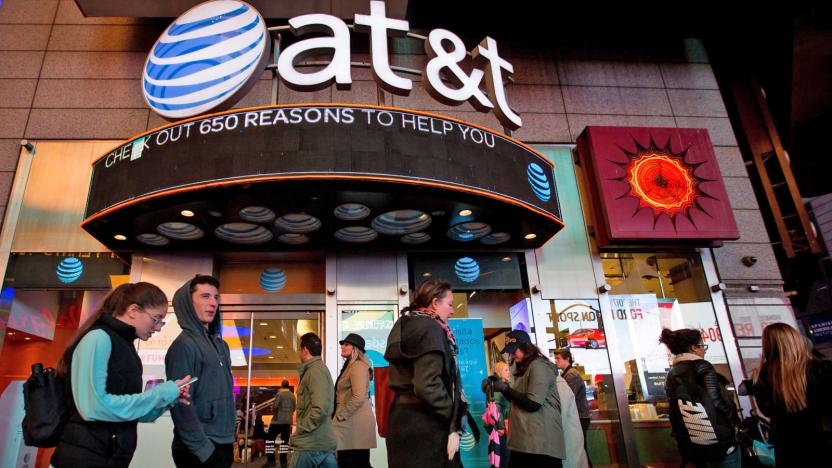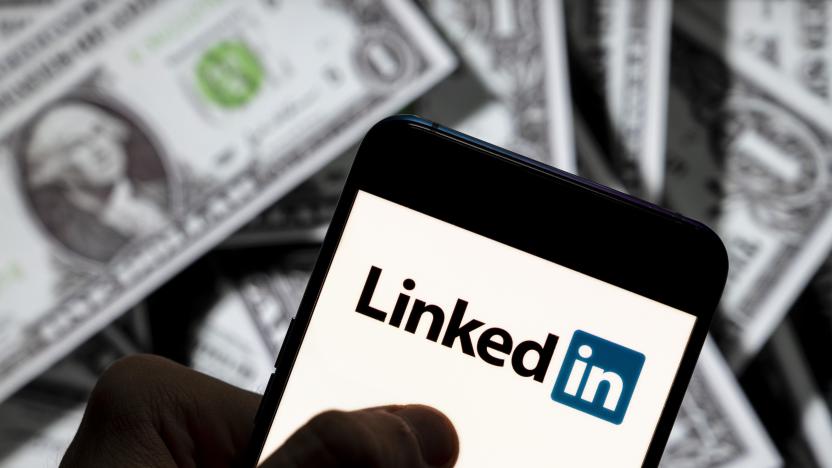spam
Latest

Google beefs up Gmail security to fight phishing attempts
Google has just added a bunch of new security features in order to protect Gmail users from spam and phishing messages. Though they didn't say as much, the bumped-up protection is likely in response to the phishing scam that went around earlier this month. The attack peddled a bogus Google Docs file in attempts to gain access to users' Gmail accounts. Google took measures to boost its security shortly after the incident, but the features announced today go even further.

Facebook limits News Feed links to scammy ad-filled sites
Facebook regularly tweaks your news feed to make sure you only see "quality" posts and ads. It's banned fake news sites from using the Facebook ad network, added an easy way to report false news posts, and has even hired third-party fact-checkers. Today, however, the company announced that it would focus its efforts on websites that contain "little substantive content and that is covered in disruptive, shocking or malicious ads." The news feed update is meant to help reduce the "incentives of financially-motivated spammers."

Facebook busts up international spam operation
While Facebook has spent significant time fighting fake news on its network, it continues to battle another plague to its social platform: Fake accounts. These are often used to spread low-quality content, so the internet titan has been ramping up its crackdowns. Hot on the heels of banning 30,000 profiles earlier this week, Facebook announced it has disrupted a massive international spam operation the network had been combating for the last six months.

Facebook tweaks the feed to bury fake news and clickbait
Just how much fake news trending all over Facebook actually influenced the election is still up for debate, but the question pushed the social media company into crackdown mode. In the last few months, it cut off ad funding for dubious posts and added a button to let users flag questionable content for review by third-party fact-checkers. To more actively combat shady stories, the social media giant is tweaking its News Feed algorithm to promote more legitimate and viral content.

Windows 10 is spamming Chrome users with a Microsoft shopping app
Microsoft really wants you to install and use its products on your computer. Beyond the myriad Start menu ads plaguing Windows 10, now users have to contend with pop-ups for Redmond-made stuff if they have Google's Chrome browser installed as well. Myce reports (image below) that when Chrome is pinned to the taskbar an ad for Microsoft's Personal Shopping Assistant extension hovers over the browser's familiar icon.

AT&T service prevents scam calls from reaching your phone
Yes, you can block phone numbers used for robocalls and tech support scams, but that usually means having to take at least one call (or running the right software) before you realize something's fishy. And AT&T, at least, is trying to do better. In response to the FCC's request for tougher action, the carrier has introduced a free Call Protect service for HD Voice (voice over LTE) users that aims to block fraudulent and spam calls, in many cases before they even reach your phone. An automatic fraud blocking feature will stop scams at the network level, while you'll also get warnings about suspected spam calls if you're in an HD Voice coverage area.

The truth about Trump's secret server and Russia
It's hard not to follow the hacks and cracks of the election, even if you don't want to -- every day there's a new accusation or hysterical revelation. So you no doubt saw "Was a Trump Server Communicating With Russia?" postulating that Donald Trump's connections to Russia were confirmed with the discovery of a secret email server. That story came from Slate and was based on a connection a researcher found between a Trump Organization server and a Russian bank. News outlets took the bait and ran with it, telling us that this was as damning as it appeared.

Spam texts could help solve a Canadian murder case
If you own a mobile phone, chances are that you've received at least one spam text message. Normally, an unscrupulous company is trying to hawk its financial services or help you save money on a pair of Ray Bans, but Canada's Ontario Provincial Police (OPP) will today take the unusual step of sending thousands of potential witnesses unsolicited text messages in an attempt to solve a 2015 murder case.

Facebook opens up Messenger to ad bots
Right now, Facebook lets Messenger bots from brands like Expedia and HP help you make a purchase, but they can't try to sell you a new product. However, a policy change means those automated assistants will soon be able to send subscription messages, ads and promotions for services like makeup consultations. If you're worried about spam, Facebook emphasized that the user is in control. "All conversations between businesses and people must be initiated by the person receiving the messages, who can then mute or block the business at any time," wrote Product Manager Seth Rosenberg.

Uber faces lawsuit over aggressive Austin voting ads
Uber is known for being aggressive when it wants changes to the law -- just ask anyone who has received email after email asking for support. However, its latest effort might have crossed the line. The app-hailed transportation service is facing a class-action lawsuit over a text messaging campaign that called on Austin residents to vote for Proposition 1, which would let ridesharing companies operate without running fingerprint background checks. The lawsuit claims that Uber not only spammed Austinites with "vote for Prop 1" messages without their consent, but made it difficult to avoid those promos. Text replies went unanswered, and calling the source number would only give you an automated error message. In other words, it sounds like the sort of robodialer that would violate the Telephone Consumer Protection Act.

Get ready for ads in Facebook Messenger
If you've been chatting with businesses via Facebook Messenger, don't be too surprised if they start sending you ads in the near future. A leaked document obtained by TechCrunch apparently says that users who've voluntarily messaged a company could open themselves up to the spam as early as this April. Note the "voluntarily" bit there. From the sounds of it, Facebook is going to be working pretty hard to ensure that the incoming messages are actually welcome, lest you get annoyed and uninstall the app.

Facebook should know by now what's news and what's spam
Late last week, The Guardian published an interview with a survivor of Obama's first drone strike, which occurred in tribal Pakistan on his third day as president. It detailed the impact the attack had and raised concerns over the civilian damage these drone strikes can cause. But as important as this story sounds, you would not have been able to share it on Facebook. If you tried to do so, Facebook would have blocked you.

Yahoo faces class action lawsuit over text spamming
Yahoo probably isn't the first company you'd think of as a text spammer, but the courts might soon beg to differ. A judge has ruled that the internet pioneer has to face a class action lawsuit for sending Sprint customers automatic "welcome" messages when someone else pinged them on Yahoo Messenger in 2013. These were effectively small, unwanted sales pitches for Yahoo's services, according to the lawsuit -- and it doesn't help that they sometimes followed spam from another party.

Researchers hide messages in a sea of spam
Researchers are trying quantum cryptography and other exotic ways to keep your missives safe, but here's a new one: junk mail. A team of computer scientists from MIT's CSAIL have devised a system called "Vuvuzela" that adds noise to messages, making them virtually untraceable to the recipient or sender. While it uses nodes like the Tor "dark internet" router, it only requires a few servers and relies more on numerous fake messages to confuse hackers. If scaled up, the technique could give you nearly mathematical certainty that your messages and even metadata are secure.

People tweeted their phone number and got spammed with cat facts
There are people who share their real phone numbers via a tweet. Yes, really. One programmer decided to teach those folks a lesson by spamming them with cat facts. Using phone numbers that were beamed out in public tweets, the joke included sending text messages about cats until the person tweeted at Edward Snowden "Meow, I <3 catfacts." Although Snowden isn't in on the gag, he is a bit of a feline fanatic. He was also quite forthcoming about his own Twitter faux pas. In this case, automated script pulls data from the Twitter API before blasting out the messages full of meow-based facts with an anonymous texting app. The programmer says the goal of the stunt is to teach users who are so loose with their personal details a lesson on how a more ruthless hacker might attack their mobile devices. Pretty solid way to do so, if you ask us. [Image credit: AFP/Getty Images]

Google is purging hacked spam from your search results
It's bad when your web searches include sites that are mainly marketing fluff, but it's much worse when that fluff has been hacked into otherwise legitimate sites. Well, Google has had enough of this attempt to game the system. It's tweaking its algorithms to "aggressively" cull hacked spam from results, leaving you only with sites that intended to include the content you're looking for. While the changes will only affect about 5 percent of searches when all is said and done, that could mean a lot if it helps you avoid compromised pages and the malware that might be lurking inside. [Image credit: AP Photo/Mark Lennihan]

Add this: LinkedIn must pay $13 million to annoyed users
Networking site LinkedIn has agreed to pay out $13 million for overzealous marketing of its services on behalf of users. You've likely received one of the emails, which appear to come from a contact (below), saying something like, "Hi, I'd like to add you to my professional network on LinkedIn." That line actually makes a fine universal cartoon caption, but LinkedIn then sent several similar follow-up emails without saying it would do so in its terms of service. Many users felt that made them look needy (the email mentions your contact's name no less than five times), which is why they launched a class-action suit against the company in Lucy Koh's California court.

'Spam King' guilty of posting 27 million Facebook messages
One of the web's all-time notorious spammers is facing jail after pleading guilty to sending 27 million unwanted messages to Facebook users. Sanford Wallace, aka "the Spam King," aka "Spamford Wallace," admitted that he unlawfully accessed over 500,000 accounts on the network between 2008-9 in violation of a court order. This is far from his first rodeo -- Sanford was annoying consumers well before the internet came along, when he sent junk faxes in violation of laws enacted in 1991. Since then, he's faced lawsuits for email spamming, multiple-window launching (remember that?) spyware scams and MySpace phishing, to name a few.

FTC names its $25,000 counter-robocall contest winner
Despite being banned by the Federal Trade Commission, prerecorded robocalls are still a common hassle for Americans. That could soon change now that the FTC has announced the winner of its $25,000 Robocalls: Humanity Strikes Back contest. The winning team of Ethan Garr and Bryan Moyles developed a mobile app called Robokiller that works a lot like your email's spam folder.

Google uses AI to rid your Gmail inbox of more spam
Spam is always annoying, but it can occasionally be disastrous. Google has now deployed its artificial neural network to stop more of it from arriving in your Gmail inbox, something it hinted at earlier. It's designed to "detect and block the especially sneaky spam -- the kind that could actually pass for wanted mail," according to the company. The system also uses machine learning to track your usage patterns and figure out if you want certain kinds of mail, like newsletters or promos. Most critically, Google said that Gmail is now better at catching impersonation -- when emails appear to be from a known contact, but were sent by someone who is definitely not your friend.










